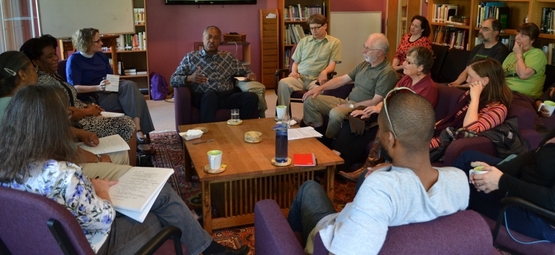
"Reconciliation: Joining God’s movement to heal and bring people into relationship across differences"
Key Learnings from the Study of "Reconciling All Things"
During the month of June, 2015, a group of committed parishioners read and discussed the book, Reconciling All Things, A Christian Vision for Justice, Peace and Healing by Emmanuel Katongole and Chris Rice.
Here are their very thought provoking and insightful responses to what they learned.
Lloyd Latty
"Katongole and Rice, the authors of "Reconciling All Things," argue that Christians look no further than the Bible for a comprehensive story in which to place our call to reconciliation. This God-story stretches back to the beginning of creation, is grounded in historical human drama, and calls us to the future reality in which all things will be reconciled to God. Even a cursory reading of Scripture points the reader to a reconciling God. As the people of St. Matthew's engage in acts of reconciliation, we bear witness to who God is and to the world that is coming and is, even now, breaking into our age. Reconciliation is nothing less than "enemies and strangers becoming friends and all becoming God's companions" (p. 145).
Cindy Howard
Here are the points from the book that have caused me to think more deeply about my spiritual health and relationship to others -
- Lamentation as public confession in the sequence of - truth, cost and conversion
- Looking to God for resources when we are "in over our head"
- The need to unlearn speed, distance and innocence
- The reminder that God is doing a new thing - that the doing takes time - that we are a critical part of the doing -
- The reminder that hope celebrates joy and beauty
- Reconciliation is grounded in God's story
- Reconciliation is God's gift not a result of our work
- Hospitality in the midst of interruption - being present -
- Leaders absorb pain without passing it on to themselves or others
- God's gifts of prayer and meditation, community, theological reflection, sabbath give us courage
When I think of what this means in my own life I think of four areas: my nuclear family, extended family, work and community - recently, the work place has been the area of my life where reconciliation is a constant challenge - trying to bring about reconciliation in the middle of deep pain - and sense of betrayal - for several of my colleagues from decisions made by previous leadership - and yet not absorb - or pass on the pain to others - no way that I could pull that off alone - what a relief to be reminded that I simply must be present - listen - the gift of healing and restored relationship will come from God.
Secondly, the imperative to slow down - this is always a gift for me on Sunday morning - to slow down - to kneel down - to realize that the speed toward - more publications, more grant funding, more patients seen - is not the norm in the kingdom of God - rather we are invited/commanded to slow down, be still and remember/worship the Creator - I'm grateful.
Lisa Wiens Heinsohn
What I have learned about reconciliation is that I sense it as the heart of Christian faith - for us to be reconciled with God, others, ourselves, and all creation to be restored to healing relationships - relationships without violence - restored to the image of the relational and triune God. For me, I sense relocation as the beginning of reconciliation - starting with God's relocation in the incarnation. "The Word was made flesh and dwelt among us." God relocated to us, to our places of joy and pain, to meet us, love, heal and forgive us as we are. For followers of the way of Jesus, this also means being sent to crazy places - to relocate, even if that just means a paradigm shift about where we find our sense of belonging and home - instead of in our physical homes, tribes, clans, and communities of like-minded people, to find our sense of belonging in the triune God. Then we are freed to follow God's call - like Abraham, who went on a crazy journey of relocation. Like the early disciples, who - because of persecution - were sent to Jerusalem, all Judea, Samaria, and from there to the ends of the earth.
I also really appreciate the reality that reconciliation is about learning to voluntarily go to the places of brokenness and pain in the world, to stay there long enough for the pain to become our own - and then, most importantly, to NOT pass that pain on to others. This is part of reconciliation. In my own experience, suffering begets suffering; when I am suffering the most, that is also when I am the most self-centered, critical, least compassionate, most likely to lose my temper / lash out, least likely to have compassion. How do we experience the strength and the joy of Christian fellowship / communion, grounded in the incarnation, enough to relocate to places of the world's pain, but not simply become part of the fabric of violence, resentment, etc. that currently characterizes relationships across lines of difference? It probably starts with learning to do so in our own small and daily lives.
Tina Maynor
Each week was full of timely insights, informing our understanding of how we can work for reconciliation at St. Matthew's and in our communities.
One key learning has been lingering with me:
A Rwandan proverb, "To go fast, walk alone. To go far, walk together." The authors go on to elaborate, "When we learn how to slow down to make room for walking together across divides, we become more Christian." What a perfect reminder as we seek to go deeper into relationship, together, with those in our communities who face the greatest challenges
